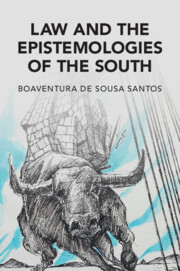Book contents
- Law and the Epistemologies of the South
- CAMBRIDGE STUDIES IN LAW AND SOCIETY
- Law and the Epistemologies of the South
- Copyright page
- Contents
- Preface
- Abbreviations
- Part One The Tragic Optimism of the Law: THE END OF A STORY
- Part Two Epistemologies of the South and the Law
- Part Three The Abyssal Law under the Mode of Abyssal Exclusion
- Part Four Real Legal Utopias: Interrupting the State
- Part Five Real Legal Utopias: Interrupting the Law
- Fourteen Law and Revolution in Portugal: Experiences of Popular Justice after the Carnation Revolution of 1974
- Fifteen Popular Justice in Cape Verde
- Sixteen The Landless Rural Workers’ Movement in Brazil and Its Struggles for Access to Law and Justice
- Seventeen The Law of the Excluded: Indigenous Justice and Plurinationality in Bolivia and Ecuador
- Eighteen Decolonising Justice and Democratic Peace in Colombia
- Part Six Real Legal Utopias: Interrupting Hegemonic Human Rights
- References
- Index
- Cambridge Studies in Law and Society
Eighteen - Decolonising Justice and Democratic Peace in Colombia
from Part Five - Real Legal Utopias: Interrupting the Law
Published online by Cambridge University Press: 07 August 2023
- Law and the Epistemologies of the South
- CAMBRIDGE STUDIES IN LAW AND SOCIETY
- Law and the Epistemologies of the South
- Copyright page
- Contents
- Preface
- Abbreviations
- Part One The Tragic Optimism of the Law: THE END OF A STORY
- Part Two Epistemologies of the South and the Law
- Part Three The Abyssal Law under the Mode of Abyssal Exclusion
- Part Four Real Legal Utopias: Interrupting the State
- Part Five Real Legal Utopias: Interrupting the Law
- Fourteen Law and Revolution in Portugal: Experiences of Popular Justice after the Carnation Revolution of 1974
- Fifteen Popular Justice in Cape Verde
- Sixteen The Landless Rural Workers’ Movement in Brazil and Its Struggles for Access to Law and Justice
- Seventeen The Law of the Excluded: Indigenous Justice and Plurinationality in Bolivia and Ecuador
- Eighteen Decolonising Justice and Democratic Peace in Colombia
- Part Six Real Legal Utopias: Interrupting Hegemonic Human Rights
- References
- Index
- Cambridge Studies in Law and Society
Summary
This chapter focusses on legal pluralism and restorative justice in Colombia since 2016. It is a period defined by the agreement reached between the Colombian Government and the most important guerrilla group (FARC), namely the La Habana Agreements which brought to an end a period of political violence that had lasted for more than fifty years. The law of ethnic peoples is one of the forms of collective organisation through which subalternized communities have sought to strengthen their identities, languages, territories, legal systems, and authorities in order to resist old and new colonialisms. The intercultural framework for transitional justice seeks to formulate a concept of justice that responds to the need to heal the wounds associated with past wrongdoings and counteract contemporary forms of injustice directed against various ethnically differentiated victims. Intercultural dialogue must be based on the capacity to listen in such a way as to understand and grant full credibility to the ways in which the silenced voices are intended to be heard. The role of transitional justice is a catalyst in the search for strategies to combat systematic human rights abuses and violations, due to the ravages of historical and existing colonialism. The limitations of JEP (Special Jurisdiction for Peace) may be a factor that prevents it from fully complying with its historical mission, especially if this is compounded by a lack of political will, both on the part of the government in power and the more conservative and extremist sectors of Colombian society.
Keywords
- Type
- Chapter
- Information
- Law and the Epistemologies of the South , pp. 531 - 558Publisher: Cambridge University PressPrint publication year: 2023

